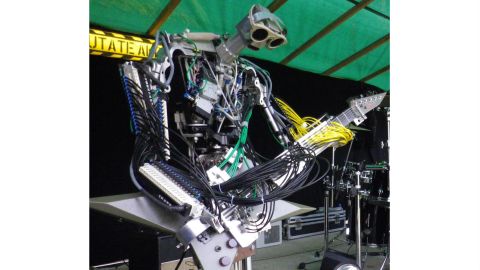Raging Machines: Compressorhead, the First Robot Rock Band

What if Angus Young had 78 fingers? He’d have better job security, for one thing, since this robot can match the AC/DC guitarist lick for lick. Fingers is the name of this robot, who was built from recycled scrap metal and has enough robotic digits to cover the entire fretboard.
Along with Bones, “the highest precision bass player in known existence,” and drummer Stickboy, who plays a 14-piece kit, these robots make up the German all-robot heavy metal band Compressorhead. According to the band’s website, which pokes fun at its human readers as “meatbags,” the drummer, like the guitarist, “was created to exacting specifications. 4 arms, 2 legs, 1 head, no brain.”
Compressorhead’s performance is controlled by MIDI (Musical Instrument Digital Interface) and electro-pneumatic valves that are synchronized with the robots’ head-banging movements. Their repertoire includes Motorhead‘s “Ace of Spades,” Led Zeppelin’s “Whole Lotta Love,” and, appropriately enough, in the video below, Rage Against the Machine’s “Bullet in the Head.”
Watch here:
What’s the Big Idea?
Music, one of mankind’s most prized creations, has been both composed and performed by machines for some time. Ray Kurzweil, for instance, developed pattern-recognition software that analyzed and synthesized the works of classical composers like Chopin and Mozart, landing the young inventor on CBS’s “I’ve Got a Secret” in 1965. On the show, Kurzweil performed a piece of music that was written by a computer. That launched a career in pattern-recognition interfaces, from character recognition to speech recognition.
So what will music sound like when the Singularity arrives?
We could create algorithms to lift the “exhausted” twelve-tone technique to new heights. The command and precision of nano-scale machines would make the flabby human fingers of Angus Young, not to mention the entire Berlin Philharmonic orchestra, sound like amateur hour.
Or, perhaps, robots are already surpassing humans with their technical prowess?
In a post on Compressorhead’s site, the band tackles this question from a reader, offering this coy response to the meatbag: “I don’t need to be smarter than you to play the guitar the way I do, and I don’t need to be any smaller.”
What’s the Significance?
While Compressorhead dips us deeper into the uncanny valley, the robot band cannot replicate the punk attitude of the Ramones or the soulfulness of B.B. King. Yet.
As Ray Kurzweil told Big Think in a recent interview,
Sometimes people think that emotion and art are sort of sideshows to human intelligence and the real essence of intelligence is thinking logically. If that were true, computers are already smarter than we are because they’re much better at logical thinking than we are. It’s actually things like being funny, being sexy or expressing a loving sentiment, maybe in a poem or in a musical piece. That’s the cutting edge of human intelligence. That’s what today humans are still better than machines at. And the reason for it is we can think with our neocortex with a greater number of levels of this conceptual hierarchy.
Something like “she’s pretty” is at a very high level in terms of the conceptual hierarchy. But we’re adding the ability of computers to think in conceptual hierarchy, particularly as we can master the technique that’s used in the human brain.
And so when the Singularity arrives, The Telegraph notes, there will be one obvious advantage to having robot rock stars: “Any budding rock managers wishing to manage the group can rest assured they are unlikely to spend much time throwing tantrums or bickering over royalties.”





